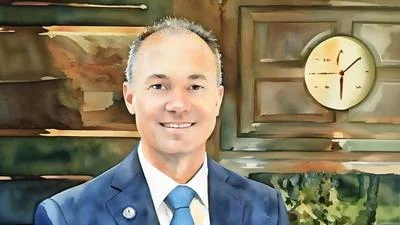This transcript has been edited for clarity.
Federal Newswire
Can you tell us about yourself?
Steve McKee
I'm an idea guy. I'm an author. I've written three books, started two companies, and I just sold my company last year, wrapping up 40 years in the marketing, branding, idea generation business. I'm taking everything I learned in the world of commerce and now applying it to culture and politics–what happens when physical things, which are temporal, collide with ideas, which are eternal. How do those two things relate? That's my area of interest.
Federal Newswire
How do you market an idea?
Steve McKee
Well, in the world of think tanks, everything begins with an idea. Every policy, every war, every business, every innovation. It all begins with an idea. Typically, those of us who develop the ideas start with subject matter experts, whether it's in science or business, or you name it.
We start with something that's kind of complicated. That's why subject matter experts develop new ideas, they come up with something that's kind of complicated. The key is to take the complex and make it simple.
I was recently chatting with a client. I watched three hours of his YouTube speech explaining his concept [before] I finally got it. All we [have] to do is get those three hours down to three seconds. We have very short attention spans, and it's important to convey an idea so quickly that you pique people's interest and they want more.
Federal Newswire
Can you tell us about your books?
Steve McKee
The first book [that] really defined my career is called “When Growth Stalls, How It Happens, Why You're Stuck and What to Do About It.”
Most companies don't make it past the first generation. But even those that do, within 10 or 15 years, they all stall.
That was really groundbreaking. It set my company's course because we identified four internal dynamics that bedevil every company.
The Second book is called “Power Branding.” It's 75 best-practice principles from the world's leading brands. I had a lot of fun writing it because it's 75 chapters, but they're two and a half pages each.
Last year I just released “Turns: Where Business is Won [and Lost].” The premise is [that] we all come to “turns,” some of which we can anticipate, many of which we can't. How you navigate those turns is the difference between success and failure.
So all three books build one upon another.
Federal Newswire
What are the four factors?
Steve McKee
I'll share them with you since I teed it up. You can relate to this in your personal life, and in your life alignment or the lack thereof.
[Factor number] one is a lack of consensus among the leadership team. The second [factor] is loss of focus, often due to external events like recession or a new competitor. Very common. The third factor is the loss of nerve. [If] you lose your [nerve], you lose your courage. Often, that manifests itself through budget cutting and how you spend your money, but not always. Sometimes it's just [that] you get scared…The fourth factor is inconsistency. When all the above are happening, you start to look for silver-bullet solutions.
Interestingly enough, we came about it because it happened to my company. We actually made the list of 500 fastest growing private companies in America. Then we promptly stalled for no apparent reason.
After two years of drift where we had 94% turnover, we went to the cushions in our sofa, found all the money we could, and commissioned a market research study of Inc. 500 companies. That study led to a second study. It led to a whole breakthrough where we identified the four factors. Sure enough, we had been suffering from all four. We addressed those issues, turned our company around, [and] I began speaking on it.
Federal Newswire
How did you come to know there are four factors?
Steve McKee
I do a lot of research for a living, and normally I'm the independent, objective outside advisor doing the research on behalf of my clients. In this case, I was looking at reams of research and it was like I was holding up a mirror to my situation.
It was really encouraging because I thought when our company stalled, it was my fault. What I learned was, this is actually very common–about one in five companies that had been among the fastest growing in America.
Our research showed that it happens to every company sooner or later. It's hard to be creative when you're feeling discouraged, but as I was able to separate myself and say, “okay, maybe I'm not an idiot”…we could get creative about solving it.
Federal Newswire
What are you doing with your work now?
Steve McKee
Well, I'm having fun. My passion is the spreading of ideas. I'm looking to bring this craft of understanding how to simplify messages to the worlds of culture and politics, which [is] really very important, especially in the political realm.
Federal Newswire
How does this relate to approaches in politics?
Steve McKee
In the advertising and marketing business, the word that people tend to use is persuasion…I think in the realm of ideas, almost by definition, what we're trying to do is influence others, and it's very difficult to influence others through being caustic or fighting. In fact, in the private sector, we would say you never, ever go after your competitor. McDonald's doesn't go after Burger King because that's not going to serve McDonald's interests.
McDonald's doesn't even say “we have the best tasting French fries” because that's a statement of objective fact where people could agree or disagree.
They figured this out 50 years ago. They will show a father and a son having a moment over a box of French fries. It's out of the realm of argument, and in the realm of emotion and persuasion and influence. That's why when I took my son to get his first pair of basketball shoes, we went to McDonald's afterwards–because that's what fathers and sons [do].
They figured out, as did Coca Cola, as did all the great brands in the late 1960s and early 1970s, that it wasn't about convincing people. It was about influencing people. In the realm of politics, I think we're still about convincing people.
Federal Newswire
Is it also now about labeling and canceling people?
Steve McKee
History shows that doesn't turn out well. I think one of the big reasons for this is there's a timeline. If it's an election, you have to get a 50% plus 1 margin. There's a timeline on everything. I think it naturally makes people more intense, and the pressure is to do those sorts of things.
A wise politician would recognize you have to have a short term, mid-term and long term plan to win and woo people to [their] positions, not by tearing down the other guys.
I just recently looked at a poll result for a political campaign that I'm friendly with. What was so interesting is they had around 15 or 18 reasons why you should vote for this person, and 15 or 18 reasons why you should not vote for the other guy. I said, “that may all be true based on your research, but none of that's going to make its way into people's minds.”
It's not a three-seconds, Barack Obama, “Hope and change.” Or Ronald Reagan’s “Morning in America,” Bill Clinton’s “It's the Economy, Stupid,” Donald Trump’s “Make America Great Again.” They're not just words. They capture a moment.
Federal Newswire
Should marketers also try to appeal to people’s values?
Steve McKee
In the branding and marketing business, empathy always comes before message. Always. Your target audience needs to be as broad as necessary, but as narrow as possible. The better you understand your target, the more intense you can make your appeal.
Federal Newswire
Are people listening to this advice?
Steve McKee
I would say two things. One, we'll find out, because if one or two people are watching this [and] the lights go on, they're listening.
But I'm going to twist it a little bit. If they wouldn't listen, [it] means that we're not approaching them right. We're not understanding them well enough. We can't look down on them for not listening. We should look down on ourselves.
Federal Newswire
Billy Joel said to always tell the truth, even if it hurts. The second thing he said was to hit the 57 on the Heinz bottle and the ketchup will always come out. I think those are examples of the three second rule.
Steve McKee
Yeah, tell the truth and hit the 57. Those are both three seconds.
I've had this conversation many times with people who have issues with the advertising industry. The industry as a whole has every incentive to tell the truth, and no incentive not to. But that doesn't mean you have to argue.
I’m fond of saying [that] the world of marketing and branding is not a courtroom. It's a carnival. You're not making an argument to a jury. You're trying to get people to enter and say, I want to get on that ride.
Federal Newswire
It seems like politicians and media like to label the business community as pariahs? Is this an exaggeration?
Steve McKee
I don't think so. Hollywood does it, too, because it's so easy. There's no single force to fight back.
At one level, it matters because we're demeaning everything. But on the other hand, if I'm an entrepreneur or if I'm a business leader, I'm going to keep on serving my customers and serving my shareholders, because that's what I do. I think you just have to marshal on.
It's not unlike when your child says, “I don't like you now.” You still are going to be Dad. You're still going to do what you're supposed to do.
Federal Newswire
What are the challenges with Marketing today?
Steve McKee
The big challenge these days is with all the new technology. There are so many wonderful opportunities, but it's also transaction-focused and it's tending to make the industry more shortsighted.
What we used to call brand building is still very important in one respect. Branding is sowing seeds, and advertising is reaping. You're reaping crops and if you don't keep sowing, sooner or later you're going to run out of things to reap.
I think that's a big challenge to the industry right now. Forward thinking marketers understand that.









